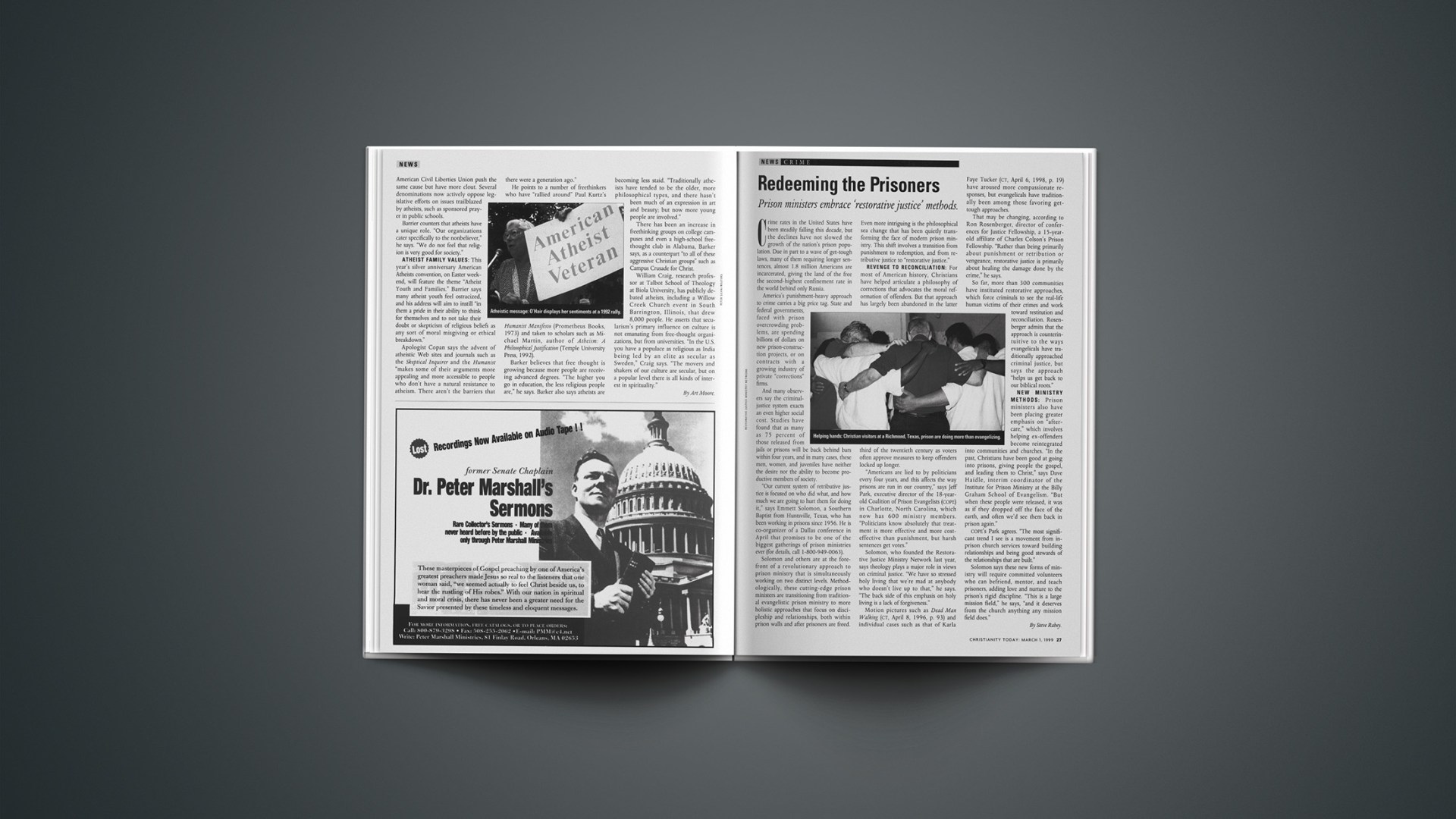Crime rates in the United States have been steadily falling this decade, but the declines have not slowed the growth of the nation’s prison population. Due in part to a wave of get-tough laws, many of them requiring longer sentences, almost 1.8 million Americans are incarcerated, giving the land of the free the second-highest confinement rate in the world behind only Russia.
America’s punishment-heavy approach to crime carries a big price tag. State and federal governments, faced with prison overcrowding problems, are spending billions of dollars on new prison-construction projects, or on contracts with a growing industry of private “corrections” firms.
And many observers say the criminal- justice system exacts an even higher social cost. Studies have found that as many as 75 percent of those released from jails or prisons will be back behind bars within four years, and in many cases, these men, women, and juveniles have neither the desire nor the ability to become productive members of society.
“Our current system of retributive justice is focused on who did what, and how much we are going to hurt them for doing it,” says Emmett Solomon, a Southern Baptist from Huntsville, Texas, who has been working in prisons since 1956. He is co-organizer of a Dallas conference in April that promises to be one of the biggest gatherings of prison ministries ever (for details, call 1-800-949-0063).
Solomon and others are at the forefront of a revolutionary approach to prison ministry that is simultaneously working on two distinct levels. Methodologically, these cutting-edge prison ministers are transitioning from traditional evangelistic prison ministry to more holistic approaches that focus on discipleship and relationships, both within prison walls and after prisoners are freed. Even more intriguing is the philosophical sea change that has been quietly transforming the face of modern prison ministry. This shift involves a transition from punishment to redemption, and from retributive justice to “restorative justice.”
REVENGE TO RECONCILIATION: For most of American history, Christians have helped articulate a philosophy of corrections that advocates the moral reformation of offenders. But that approach has largely been abandoned in the latter third of the twentieth century as voters often approve measures to keep offenders locked up longer.
“Americans are lied to by politicians every four years, and this affects the way prisons are run in our country,” says Jeff Park, executive director of the 18-year-old Coalition of Prison Evangelists (COPE) in Charlotte, North Carolina, which now has 600 ministry members. “Politicians know absolutely that treatment is more effective and more cost-effective than punishment, but harsh sentences get votes.”
Solomon, who founded the Restorative Justice Ministry Network last year, says theology plays a major role in views on criminal justice. “We have so stressed holy living that we’re mad at anybody who doesn’t live up to that,” he says. “The back side of this emphasis on holy living is a lack of forgiveness.”
Motion pictures such as Dead Man Walking (CT, April 8, 1996, p. 93) and individual cases such as that of Karla Faye Tucker (CT, April 6, 1998, p. 19) have aroused more compassionate responses, but evangelicals have traditionally been among those favoring get-tough approaches.
That may be changing, according to Ron Rosenberger, director of conferences for Justice Fellowship, a 15-year-old affiliate of Charles Colson’s Prison Fellowship. “Rather than being primarily about punishment or retribution or vengeance, restorative justice is primarily about healing the damage done by the crime,” he says.
So far, more than 300 communities have instituted restorative approaches, which force criminals to see the real-life human victims of their crimes and work toward restitution and reconciliation. Rosenberger admits that the approach is counterintuitive to the ways evangelicals have traditionally approached criminal justice, but says the approach “helps us get back to our biblical roots.”
NEW MINISTRY METHODS: Prison ministers also have been placing greater emphasis on “aftercare,” which involves helping ex-offenders become reintegrated into communities and churches. “In the past, Christians have been good at going into prisons, giving people the gospel, and leading them to Christ,” says Dave Haidle, interim coordinator of the Institute for Prison Ministry at the Billy Graham School of Evangelism. “But when these people were released, it was as if they dropped off the face of the earth, and often we’d see them back in prison again.”
COPE’s Park agrees. “The most significant trend I see is a movement from in-prison church services toward building relationships and being good stewards of the relationships that are built.”
Solomon says these new forms of ministry will require committed volunteers who can befriend, mentor, and teach prisoners, adding love and nurture to the prison’s rigid discipline. “This is a large mission field,” he says, “and it deserves from the church anything any mission field does.”
Copyright © 1999 Christianity Today. Click for reprint information.









